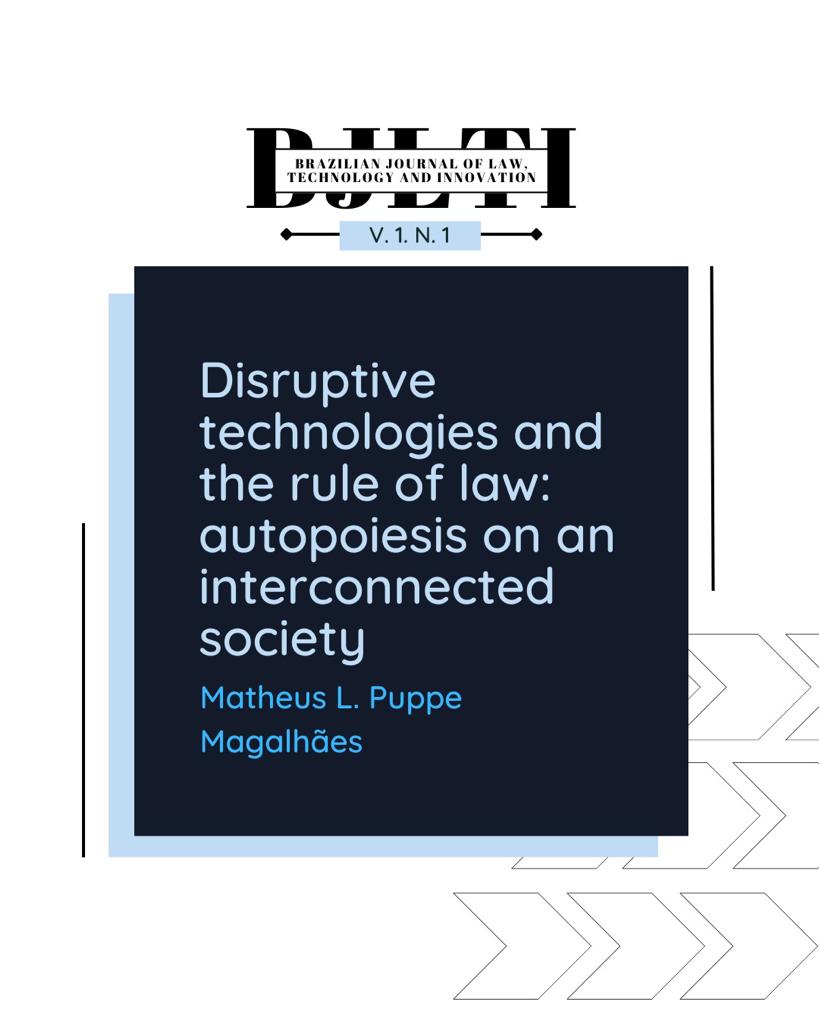Abstract
Disruptive technologies are expanding and information flow increasing. Due to the new technologies, we are facing unavoidable new challenges and ongoing changes. However, the law as the meta-technology crucial for the fourth revolution still thrives on an algorithmic and data-driven world. The law adjusts itself to the new realities, framing the ought to be’s of society, being reshaped by progressive developments. As such a mirror held up against life, it now reflects an interconnected, cosmopolitan, and global world. As a result, following the wishes and needs of markets and societies per si, corporations, private parties, universities, and even governments and natural persons are in a constant process of global legal rules creation. A process similar to the Lex mercatoria, able to effectively frame the fast-paced advances, as an autopoietic legal process - now driven by nontraditional players. A variety of technologies and processes are getting incorporated into the law - such as dispute resolution over algorithms, simplified international contracts, social “quasi-legal” sanctions widely spread by social media, protection of intellectual property, through and especially by the use of machine learning, AI and autonomous technologies - growing in importance and being materialized in previously inconceivable ways. Binding and self-enforceable, the reshaped rule of law follows society's expectations, framing autonomous technologies and artificial intelligence, yet being framed by those, ensuring our rights globally, in an effective but innovative way.
References
Asimov, Isaac. I, Robot. New York, Gnome Press, 1950.
Boeing, Geoff. Visual Analysis of Nonlinear Dynamical Systems: Chaos, Fractals, Self-Similarity and the Limits of Prediction. Systems, v. 4(4), p. 37-, 2016.
Broude, Tomer, and Yuval Shany. Multi-Sourced equivalent norms in international law. Oxford, Hart, 2011.
“Chaos Theory.” Encyclopedia of Mathematics, www.encyclopediaofmath.org/index.php/Chaos. Accessed 11 Jan. 2023.
Cheng, Bin. General principles of law as applied by international courts and tribunals. Cambridge, Cambridge Univ. Press, 2010.
Dunoff, Jeffrey L. How Should International Economic Disputes Be Resolved. South Texas Law Review, v. 42, p. 1219-, 2001.
Dunoff, Jeffrey L.; Trachtman, Joel. Ruling the world? Constitutionalism, International Law, and Global Governance. New York, Cambridge University Press, 2012.
eBay, Users Policies and Terms, Found at: https://www.ebay.com/help/policies/default/ebays-rules-policies?id=4205. Accessed 11 Jan. 2023.
Emmerich-Fritsche, Angelika. Vom Völkerrecht zum Weltrecht. Berlin, Duncker & Humblot, 2007.
Fischer-Lescano, Andreas; Teubner, Gunther. Regime-Collisions: The Vain Search for Legal Unity in the Fragmentation of Global Law. Michigan Journal of International Law, v. 25(4), 2004.
Friedman, Lawrence M. A history of American law. New York, Simon & Schuster, 2007.
Frydman Benoit. A pragmatic approach to global law. In: Muir-Watt, Horatia; Fernandez, Diego P. (Ed.), Private International Law and Global Governance, Oxford, Oxford University Press, 2014.
Günther, Klaus. Legal pluralism or uniform concept of law? Globalization as a problem of legal theory. Found at: http://www.nofoundations.com/issues/NoFo5Gunther.pdf. Accessed 11 Jan. 2023.
Habermas, Jürgen. Does the Constitutionalization of International Law Still Have a Chance? In: Cronin, Ciaran (Ed.). The Divided West. Cambridge, Polity, 2006
Herdegen, Matthias. The dynamics of International law in a globalized world: cosmopolitan values, constructive consent, and diversity of legal cultures. Verlag Vittorio Klostermann, 2016.
Hobbes, Thomas. Leviathan. Oxford, Oxford University Press, 1998.
Kant, Immanuel. Perpetual Peace, and Other Essays on Politics, History, and Morals. Indianapolis: Hackett Pub. Co, 1983.
Koskenniemi, Martti. Global Governance and Public International Law, 2004. Found at: https://www.kj.nomos.de/fileadmin/kj/doc/2004/20043Koskenniemi_S_241.pdf. Accessed 11 Jan. 2023.
Leibniz G., 1879. Explication de l'Arithmétique Binaire, Die Mathematische Schriften. Berlin, ed. C. Gerhardt, 1879.
Luhmann, Niklas. The autopoiesis of social systems. In: Geyer, F.; Zouwen, J. (Eds.), Sociocybernetic Paradoxes. London, Sage, 1986. (Reprinted in Luhmann, N., 1990. Essays on Self-reference. Columbia University Press, New York, 1986).
Luhmann, Niklas. Globalization or World Society: How to conceive of modern society? International Review of Sociology, v. 7, n. 1, 1997.
Maturana, Humberto. Autopoiesis. In: Zeleny, Milan (Ed.). Autopoiesis: A Theory of Living Organization. North-Holland, New York, 1981.
Max Planck Institute for Comparative Public Law and International Law. Global Constitutionalism, www.mpil.de/en/pub/research/areas/public-international-law/global-constitutionalism.cfm. Accessed 11 Jan. 2023.
Malynes, Gerard. Consuetudo Vel Lex Mercatoria, in Wolavers book, 1622.
Pagallo, Ugo. Lecture at the specialization course Law and Technology, at Stockholm University.
Peters, Anne. The Globalization of State Constitutions. In: Nijman, Janne; Nollkaemper, André. (Eds.). New Perspectives on the Divide between National and International Law. Oxford, Oxford Scholarship Online, 2007.
Petersmann, Ernst-Ulrich. Why Rational Choices Theory requires a multilevel constitutional approach to International Economic Law. Found at: https://cadmus.eui.eu/handle/1814/16591. Accessed 11 Jan. 2023.
Roman Law - Digest, Dig. 1.1.1.4 and Dig. 1.1.9, found at http://www.thelatinlibrary.com/justinian/digest1.shtml. Accessed 11 Jan. 2023.
Teubner, Gunther. Global law without a state. Aldershot, Ashgate, 2006. Constitutional Fragments: Societal Constitutionalism and Globalization.
Teubner, Gunther. Law as an Autopoietic System, Oxford/Cambridge, Blackwell Publishers, European University Institute Series, 1993.
YouTube, Users Policies, Terms, and Content ID. Found at: https://support.google.com/youtube/topic/4515467?hl=en&ref_topic=6186113. Accessed 11 Jan. 2023.

This work is licensed under a Creative Commons Attribution-NonCommercial 4.0 International License.
Copyright (c) 2023 Matheus L. Puppe Magalhães


